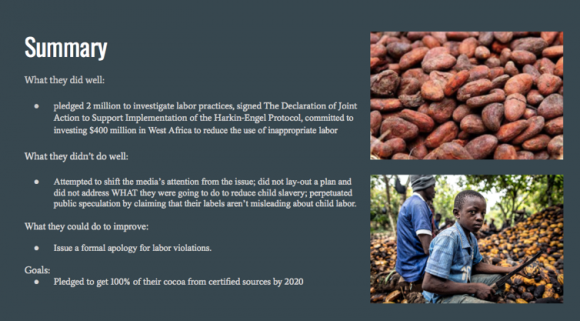SCC 420 – Risk and Crisis Communication A Course Review
November 21, 2018
Introduction:
Chapman University’s School of Communication provides students with the opportunity to explore a course in Risk and Crisis Communication – SCC 420. Over the course curriculum, students will be tasked with analyzing and evaluating the communicative dynamics of various organizations during times of crisis. Whether annotating and reflecting on case studies, or developing and delivering proper crisis communication plans at the end of the semester, students will be able to apply various methods and theories to their own crisis scenarios that they may face in their own careers.
 Assignments:
Assignments:
As for assignments, there are two major course projects that stack up to form the building blocks of Risk and Crisis Communication. First, the course challenges students to assess and transform real-world, organizational crisis case studies. Here, students will have to critique the decision-making process of specific organizations and then, will have to provide an improvement plan, showing how the organization performed both positively and negatively during the crisis. Second, towards the latter half of the semester, students will be expected to culminate everything they have learned during the semester to design and submit their own individual crisis communication plan for an organization of their choice. By doing so, students will learn just how vital it is for companies to implement proper communication in their organizational strategies and structure.

Validation and Application:
Now upon having finished this course, I can truly say that I have learned enough to have a couple prominent takeaways—one internal and one external—that I can factor into my own life.
For example, beginning with the internal takeaway, I was given a great relational methodology that I have factored into my own personal life called, “The Four Magic Phrases”. Our professor drilled into us that, when we encounter a crisis-or-problem-driven conversation with another individual, we must utilize the fundamental of listening. First, there is an immense importance to begin with a statement of neutrality like, “That’s interesting…” to signify to the person on the other end that you are not subscribing to any specific position or stance on the issue. Next, one can lead the conversation into one of four ways asking either, “Tell me more…” in order to gain more knowledge of the situation, or asking, “Now, why or what led you to DOING/ASKING/SAYING that in this situation?”, which would help in order to understand the root of the issue, crisis, or problem being brought up to you by the individual. In all, this methodology provides a great foundation to address someone one-on-one when presented with a problem or crisis-driven scenario.
Another example, ending with the external takeaway, we were taught the four Successful Communication Principles: Assume the Worst Case, Ensure that You Have a Plan, Don’t Lose Time, and People Come First. When reflecting on these principles, it may seem like common sense to consider these four steps when looking to communicate in a both a professional or crisis setting. Since I work in a retail store, which relies heavily on proper communication with both clients and coworkers, these four principles proved to be extremely helpful for my own success in my workplace. For instance, when I began working, I would ask my manager to provide me with all of the “worst case” scenarios that could go wrong pertaining to customer interaction, since I sought to “Assume the Worst Case” in my workplace. Then, I wanted to “Ensure that I Have a Plan” for each of those possible scenarios. Now, the underlying reason why I wanted to be prepared was so that I “Don’t Lose Time” or end up wasting my coworkers’ or clients’ time, too. I began to recognize that, at the end of the day, “People Come First” since all of my interactions on-the-job are with people, face-to-face.
Ultimately, these four Successful Communication Principles taught me the importance of clear, thought-out planning and preparation upon entering the workplace, in which I want to apply these principles to my career, wherever I go, because I want to be the best person I can be anyone I interact with because “People Come First”.
Of course, this is my own personal story of the impact SCC 420 – Risk and Crisis Communication has had on me, though at the same time, I believe that any Chapman student who decides to explore this course will come out of it with the same value that I have received from taking this course.

